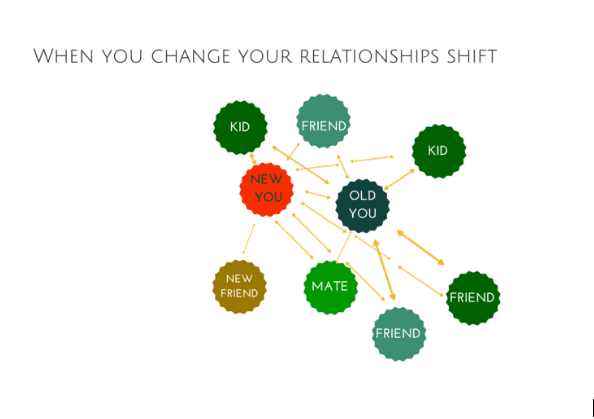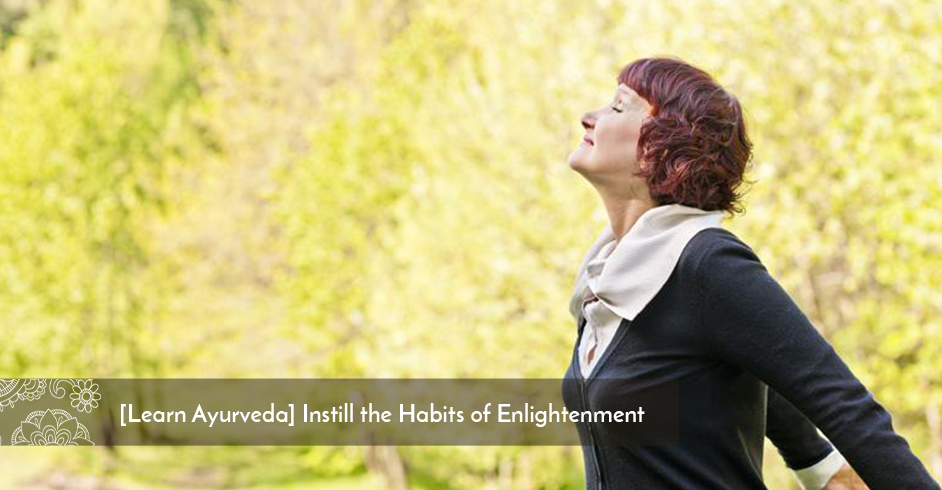[Learn Ayurveda] Instill the Habits of Enlightenment
The habits of yogis are based on biohacking.
The yogis needed mental clarity for spiritual attainment.
To achieve this mental clarity, they found out that optimizing how their bodies functioned was key.
All systems needed some upgrading, from the most mundane like taking a great poop in the early morning to deep-tissue hydration and lubrication, to refined nutrient absorption and tissue formation, to sound rest and cellular repair. When the physical body is optimized, the mind becomes clear, the emotions become loving, and from this ground our are more open, receptive and internally curious about higher levels of interconnectivity.
I coach coaches to coach the time-tested body habits of enlightenment. This became my dharma since kicking off Yoga Health Coaching in 2012, and these questions dominate my career in Ayurveda and Yoga. In my roles as an Ayurvedic practitioner and a Yoga teacher, I quickly discovered that, if I could help my clients upgrade their habits – I could help them thrive. And if I couldn’t help them upgrade their habits – I couldn’t help them.
Let’s just say I got pretty motivated at figuring out habit evolution. I specialize in people whose habits are a few giant steps ahead of their local culture. I explain more of that in a minute (and give you tips on how to supercede local culture by building your very own special better habits team).
The more skillful I became in guiding my peeps into trading outdated habits for innovative habits the more they skyrocked on their personal transformation paths towards thrive.
If you want to know what I know of this topic—meaning how to actually instill the habits in others—read on.
What Are the Habits of Enlightenment?
What are the habits of enlightenment? Once we know what they are, how can we make them our daily, automated reality?
The habits of enlightenment—at least the versions that come from the traditions of Yoga and Ayurveda—are the ones on this 10 habits tipsheet:
Click to print + pin to fridge >>
Knowing vs. Doing Habits
Once we know the habits of enlightenment—which is easy—the real work begins. Knowing you should meditate and actually doing it are worlds away on the scale of easy to hard. Doing meditation and really doing meditation are also worlds away.
Our Habits Are Communal
The first habit I teach is the earlier, lighter dinner. If people can nail this habit, the deeper habits of enlightenment will fall into place. If they don’t nail this habit, we might as well not proceed. No, it’s not that bad…but it kind of is.
When we’re trying to uplevel into better habits, the biggest obstacles are our past relationships. I made an image to convey the complexity. Unless you’re in an enlightenment relationship wherein you’re fully aware of how your habits intersect—free of all co-dependence—and you have mutual, articulated volunteer interdependence, you’re just like everyone else. If you’re like everyone else, when you start to uplevel your habits, you run into all sorts of resistance from yourself and from those around you. You’ll likely hear all about how your new habits don’t work for your social conditions or your relationships.
When you shift, your relationships shift
(See image below)
If you’re in enlightened relationships, this is terrific news. You have people in your life who fully support your evolution, your experimentation, and your desire to try something new to see if it works better.
If your relationships—with your partner, your friends, your colleagues, your mother, or your sister—haven’t reached this stage of development and objectivity, the new habits (when you eat, when you sleep, what you do in your free time, and how you organize your early morning) will stir things up.

More often than not, I see women getting more stirred up on the inside than their core peeps do on the outside. What I mean is that the habit-evolving woman will fail to shift due to the overwhelming forces around. These forces are caused by the habit momentum of her core peeps, and she’s trying to break free of the forces.
If you’re surrounded by fit people, you become more fit.
If you’re surrounded by overeaters, you’re more likely to overeat.
If you’re surrounded by meditators, you become one.
Our habits are communal. If you want better habits, you need to create new communities for yourself. Notice that I didn’t say to ditch your core peeps. Instead, expand your circles.
Your Better Habits Team
If you want to instill better habits, then develop a team. A team always has key players. Your key players should include:
- A Coach/Guide/Mentor
A coach is someone who is where you want to be, or well beyond. A coach knows how to guide others there in a fun, fast, and effective way. “Fun,” “fast,” and “effective” should be the key words to search for when you’re looking for a coach or guide. - A Buddy
You want a buddy who’s with the same coach and who can reinforce what you’re learning. You want a buddy to cheer you on and also to listen to you when you aren’t in integrity with yourself. We build accountability partners into our courses to serve as buddies. - Inspiring Gurus
Inspiring gurus are people who talk with authority, clarity, and experience about the habits you want to cultivate. Gurus can come through books, courses, magazines, or real live people to provide reinforcement and guidance. - Friends Who Are Evolving
You want friends around who are on this path with you. If you can’t find any, find those who are on some self-improvement or self-development paths. There’s always habit evolution at the core of any self-improvement path—and at any stage on the path.


